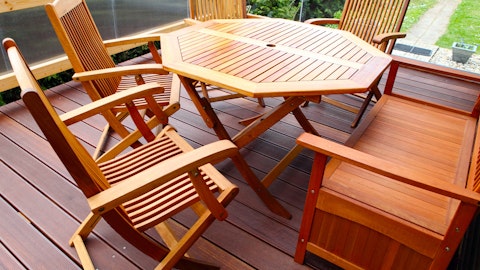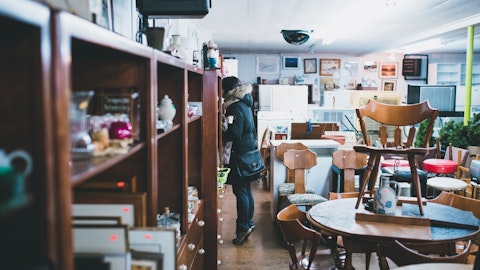Matt McNulty: Yes, so to give a little background, we’re pleased that the plant was able to get up to over 75% capacity in the quarter. As you recall, back in July it was shut down for quite a while. So, we ramped up. We’re in good shape now. We were able to deliver a portion of that amount. I would say roughly 25% to 35% of that amount we were delivering. Now what that does is it keeps our plants running efficiently up in Vermont. Given the softening of the demand, it was able to keep us continuing going. So, we’re about a third of the way through, and we’ll deliver the rest of it in this upcoming quarter.
Farooq Kathwari: Yes, Cristina this – the Vermont situation had a number of implications, because in the last few years we brought in a lot of technology. And we didn’t think of the fact of what this climate change is going to do, so a lot of the technology was put on the first floor. It’s a multi-story. Then a number of that equipment we had to repair, replace. It took time. And now some of that equipment is going on the second floor because we don’t know what’s going to happen. So most of that equipment is in, and I think that as we continue. We had to purchase new equipment and also to repair. But I think in the next few weeks, more or less, they’ll be back to normal.
Cristina Fernández: And then the second question I had, was there any specific amount as far as the store refreshes that was one-time or that was expensed this quarter that will not repeat going forward?
Farooq Kathwari: Yes, I mean, Matt, we are really talking in terms of almost what is $1 million?
Matt McNulty: About half that number, about $400,000.
Farooq Kathwari: But $0.5 million or so, because it was really paint and some minor changes, some flooring and things of that nature. The rest, of course, was products. And the impact really was selling of the floor products, which has an impact. Certainly it increased sales, but it had an impact on our gross margins. It also has an impact, as I said earlier, on our manufacturing. But about $0.5 million or so was used mostly on paint.
Cristina Fernández: Okay. And then the last question I had anything – any updates as far as what you’re seeing from a cost perspective, whether its input costs, materials or freight that we should be aware as we move through 2024?
Farooq Kathwari: Yes, Cristina, look at what’s happening right now in the transportation, in the Suez Canal. Now, fortunately for us, that is going to have some impact. But because of the fact that 75% of our products are made in North America, we are going to be less impacted. But if we had most of our products coming through – from offshore, it would be an issue. So, we did see overall container rates had come down from, let’s say, from East Asia to North America. They had gone up to $30,000 from $4,000, $5,000. They came down to $5,000, $6,000. But now you can start seeing they’re starting to increase. Our exposure is limited, because of the fact that we are involved with making our products in North America. And then, we ship our products through our own network at one delivered price nationally.
That also had an impact during the COVID. We did not change any of our prices. I mean, we did not change any, what I would say any special charges we maintained. And it was absorbed, all those increased costs, whether it was international costs or our domestic costs. Our high volumes helped us. But now most of those costs are back to normal. They’ve come down quite a bit. And we will see some impact of what is taking place internationally. For us, it is somewhat smaller than most likely others.
Cristina Fernández: Thank you. Those are all the questions I have.
Farooq Kathwari: All right. Thanks very much and, Alisa, anybody else?
Operator: No, there’s nobody else in the queue at this time.
Farooq Kathwari: All right. Well, thanks for joining and look forward to continuing our progress and in terms of repositioning our brand. It’s very, very excited. In fact, today I have 12 members or senior members of our retail division here discussing our programs and how we need to position ourselves. And they are very much involved in making sure that we take all these great advantages we have of repositioning, and that we continue our growth. So thank you very much for participating.
Operator: This concludes today’s teleconference. You may disconnect your lines at this time. Thank you for your participation.
Farooq Kathwari: All right, Alisa. Thanks.
Follow Ethan Allen Interiors Inc (NYSE:ETD)
Follow Ethan Allen Interiors Inc (NYSE:ETD)
Receive real-time insider trading and news alerts




